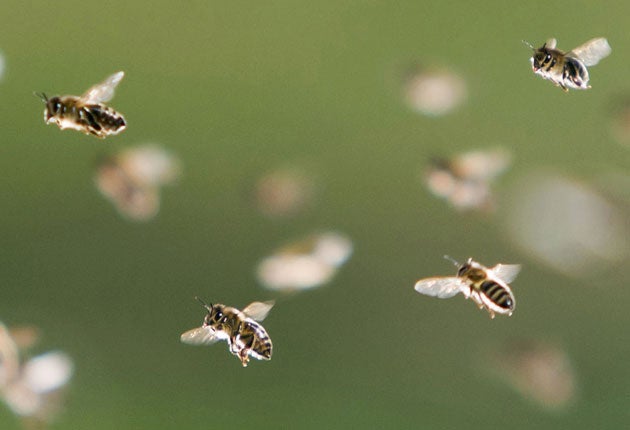Coalition adviser orders review of 'safe' pesticides

Growing concern about the new generation of pesticides used on 2.5 million acres of UK farmland has led one of the Government’s most senior scientific advisers to order a review of the evidence used to justify their safety.
There are mounting fears around the world that the growing use of “neonicotinoid” pesticides, which work by poisoning the nervous system of insects, could explain why bees and other pollinating insects are in such dramatic decline in Britain, Europe and the United States, where the insecticide is widely used.
The official British government position has been that the insecticide is safe when used correctly – but Professor Robert Watson, the chief scientific adviser at the Department for Environment, Food and Rural Affairs (Defra), has now initiated his own inquiry, The Independent can reveal, because of concerns about the alleged effects on bees.
Neonicotinoids, which provide a £500m-a-year business for Bayer, the German chemical giant, contain compounds which do not simply sit on the surface of a plant, but are taken up into every part of it, including the pollen and nectar, where they can be absorbed by foraging bees and other pollinating insects, even though they are not the insecticide’s target species. Their use has been banned or restricted in France, Germany, Italy and Slovenia.
The concerns have been greatly heightened by two independent studies, which have recently found that neonicotinoids can significantly weaken honeybees and make them more prone to lethal infections.
Professor Watson said that he is so concerned about reports on the latest laboratory studies on neonicotinoids and has asked officials in his department to investigate the published research and to report back on the strength of the evidence linking the pesticides with the demise of bees.
“I’ve asked people in Defra to get back to me on what the implications are. I’ve got people in the bee-health pollinating area and people in pesticides to review the literature for me and to come back to me exactly on this issue,” Professor Watson told The Independent.
“I don’t know what the literature says at this moment. It’s clear that we have to be concerned generally about bees and other pollinators… There is a genuine concern that if indeed there were to be a serious decline in the various pollinators, it could have implications for agriculture, no question,” he said.
Defra’s official stance, however, is that there is no evidence to suggest that neonicotinoids are unsafe when used correctly. “We have considered all recently published studies and have concluded that they do not present any new evidence,” a spokesman said. “The UK has a robust system for assessing risks from pesticides and all the evidence shows neonicotinoids do not pose an unacceptable risk when products are used correctly. We will not hesitate to act if presented with any new evidence.”
In January, The Independent revealed that the American government's leading bee researcher, Dr Jeffery Pettis of the US Department of Agriculture, had found that imidacloprid, a neonicotinoid made by Bayer, was making honey bees far more susceptible to disease from a parasite called nosema, even at doses so tiny they were later undetectable in the tissues of the dead bees. Yet his discovery, which Dr Pettis has talked about on film, remains officially unpublished nearly two years after it was made.
However, Dr Pettis’s findings have been confirmed by scientists working at the French National Institute for Agricultural Research in Avignon, who showed that the same compound caused honeybees to be more susceptible to nosema infection. Cedric Alaux, who led the research team, said the lab-based study demonstrated that the neonicotinoid together with the nosema pathogen weakened honeybees so much they died prematurely. “We saw a significant increase in mortality, but we don’t know the mechanism behind this,” Dr Alaux said.
Dr Pettis, of the US Government’s Bee Research Laboratory in Beltsville, Maryland, said that he cannot comment on the details of his study until it is published, but he confirmed that he has been in communication with Defra officials about the results.
“My lab study, and a similar one in France, show similar results in that low levels of pesticides caused changes in susceptibility to pathogens by bees in a lab assay… One caveat is that it is a lab study and thus I am reluctant to draw broad conclusions from the work,” Dr Pettis said.
“I have had conversations with Defra about my work. Unfortunately I do not have a publication date at this time, [as it is] still in review. Again, the delay is on my end as I have too many things that take up my day but I am trying to get this research published so that all can view and decide for themselves,” he said.
Dr Pettis has been invited to the House of Common next month to present his findings on neonicotinoids to MPs concerned about the possible link between the pesticides and the demise of bees and pollinating insects. He also sits on a panel of leading experts who will review a £10m research initiative into the decline of bees funded by Defra, two of Britain’s research councils, the Wellcome Trust and the Scottish Government.
Julian Little, a spokesman for Bayer CropScience UK, said that both studies showing that neonicotinoids affect bees were carried out in the laboratory and therefore may have little relevance to what happens with bees in the wild. He also said that the work is contradicted by other research carried out in Germany showing no effects on bees.
“The [two] studies clearly demonstrate that pesticides have an impact on insects in the laboratory. What is important is what happens in real situations,” Dr Little said.
Join our commenting forum
Join thought-provoking conversations, follow other Independent readers and see their replies
Comments